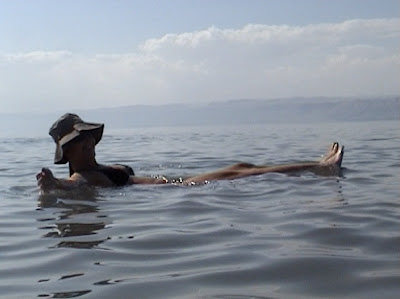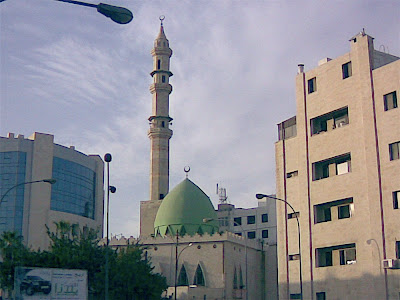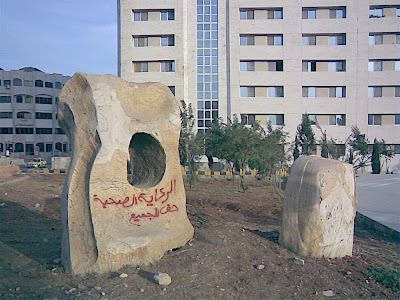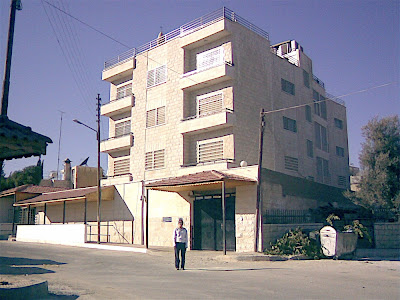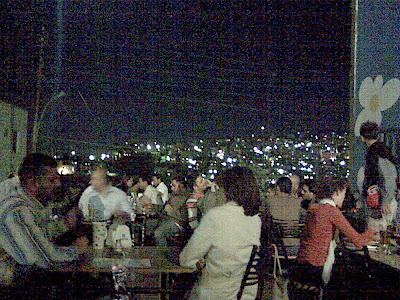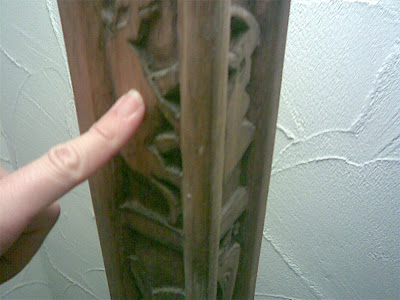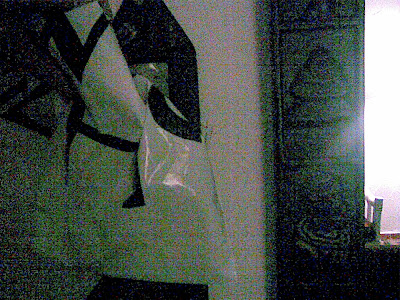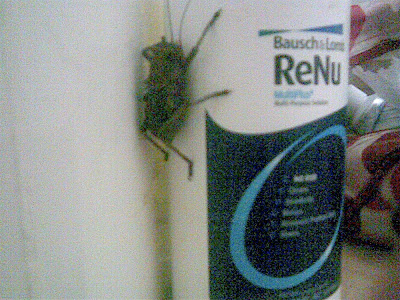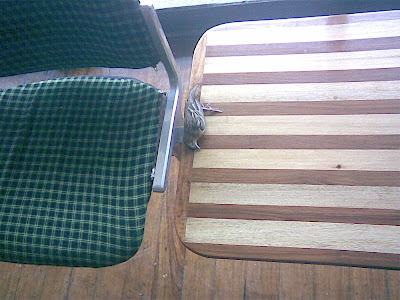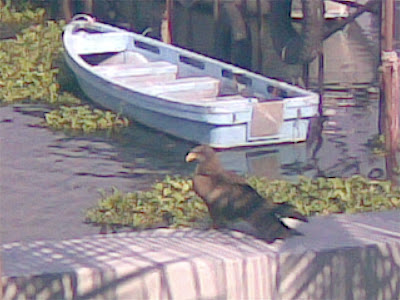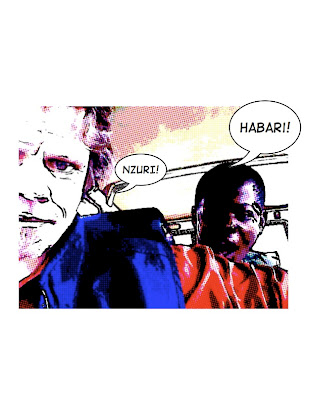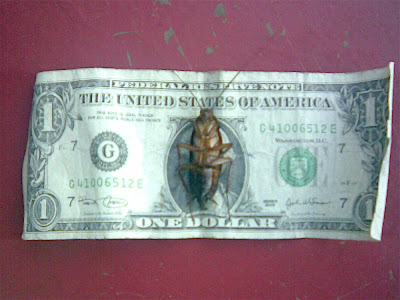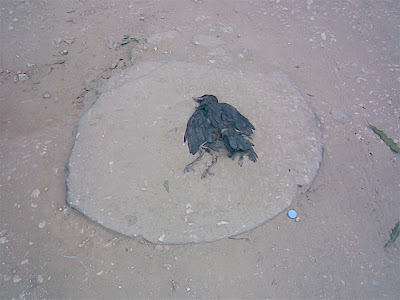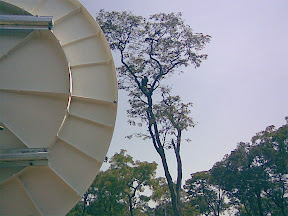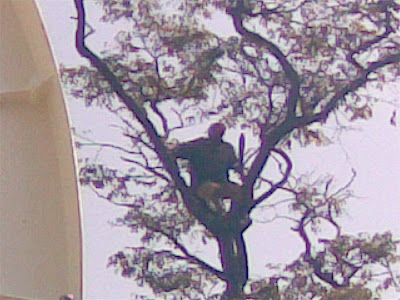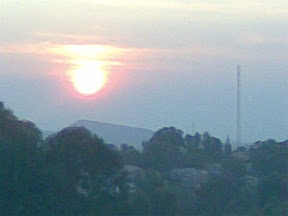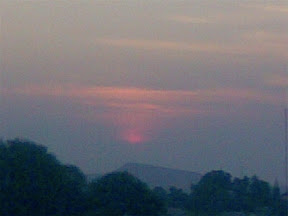Take a picture of this:
You are in a cab with clogged fuel injectors crawling its way across a third world tarmac road. It is two and a half hours before dawn. You're in Burundi. A country at peace, yes. But Peace lays across this land like a grandmother's shawl across the shoulders of a fitfully slumbering grizzly bear. Its dark as the cab rolls to a stop, but you can still make out the barricade in the mountain road and the cloaked figure coming towards you. You might begin to wonder if you will catch that flight seven hours and a country away. That's if you're an optimist.
Turns out the military keeps the road closed until seven am. But we will definitely miss our flight if we have to wait. The soldier speaks french, kirundi and some swahili. Vic, who I'm travellng with, speaks about as much french as I do swahili, maybe a slow toddler's vocabulary. Our driver, Ray, speaks swahili and a little english. Fortunately, there are bridges that reach across the language barrier, and they come in denominations of a thousand here. Ray gets out of the cab, leaving it running, and follows the askari back and out of our sight to engage in some cultural exchange. The car starts rolling backwards. I'm sitting in the back, so I reach forward and yank the emergency brake. Of course its useless, and we roll a little further before I hear Ray cuss and grunt, stopping the car's rolling with the help of the askari. They continue their negotiations leaning against the trunk of the car. Then the soldier strolls back into the darkness, Ray gets in the car and says "Bossi." Meaning the soldier went to get his superior. The superior comes back, Ray puts about $5 into his hand, and the barricade is raised. We are on our way.
As we start moving up the road which winds up through the mountain range bordering Burundi and Tanzania, I'm thinking about a few safety issues. For one, I am wondering why Ray took the tire off of the left rear wheel and replaced it with the donut spare while we were in Bujumbura. We had him put the real tire back on, it had less tread than the donut but still had good pressure, but I'm sure Ray had a reason he didn't or couldn't communicate to us. As it turns out, it was a pretty good reason. I'm also wondering about the emergency brake, which is pretty handy to have on steep mountain roads with a drop off to one side. But, what the hell, its Africa, I think, looking at the fading dashboard light and listening to the music on the lone cassette tape we had for this journey, wondering for the 20th time if the singer is really saying "I wanna be your body lotion." I'm soon lulled to sleep by the soft roll of the utterly spent shocks and the rattle of the doors.
When I wake up, we're in Mbanda. Still in Burundi, but this is where we encountered the time bending customs agent, who took our money so slowly when we entered Burundi that it seemed painless, like that parable about the frog in boiling water. It's before 7am, and there's guys walking around the customs office in towels with cups of coffee. Two offices are used as offices, the other two are rented out as bunk houses. No one we see seems to work here, and they all seem a little amused. Amazingly, one of the kids in a towel opens the actual office and beckons us in. Then he gets dressed and returns and we get our exit (Sortie) visas stamped and are on our way. We cross the Burundian side of the border no problem and then go through the neutral zone, the actual line on the map, which is a road going through a forest of Eucalyptus trees 60 feet high planted in a grid. By the time we get to the Tanzanian side it is about 9am. The immigration office here is under construction, getting a new roof, and there is rubble everywhere. One of the construction workers goes to wake up the official, and he meanders over, beckons us inside. As we are ducking under scaffolding and dodging around chucks of concrete in the hallway, I see a pile of Tanzania drivers licenses on the ground. We get into his office and exchange greetings, and then it turns out my visa in TZ was a single entry visa so he wants $50 for a new 3 month visitor visa. This brings my total cash on hand down to $50, plus 12,000 burundian ($12).
By the time we are allowed back into TZ it is 9:30. We've got a plane to catch in Kigoma, about two hours away, that leaves for Dar es Salaam at 12:15. Hakuna Matatiso (No problem). Vic keeps telling Ray to go faster, but Ray seems to ignore him, cruising slowly on the flat parts and taking his time on the slight grades. Downhill, we go fast enough.
About a half hour into TZ, we come to a complete stop, and Ray keeps revving the engine, but we don't move. Some long horned cattle cruise by on the right, and Ray shuts off the cab. We get out after the cows go by. We are on a ridge about 200 meters wide, which drops into a valley on either side about 1000 meters. Two taller ridges envelop this one. The place feels remote. Ray pops the hood on the car and as I study his face the place begins to feel more remote. I go start the cab and he starts pulling plug wires to see if they are sparking. He thinks we are losing power because not all the cylinders are firing, something I've seen before with our VW bus. It looks like all the plugs have spark, though, which means there's probably a fuel flow problem or air/fuel mix, ie. something not fixable with a crow bar and my computer tool kit. I'm thinking, remoteness-wise, siberia or the open ocean. Yeah, so now I walk around the car, remembering the donut spare we changed to a real tire in Buja, and both rear tires are looking very bad. The one I was worried about, left rear, is about half pressure. The right rear one is totally flat. No signal on the cell. Nowheresville is a sprawling metropolis and this road doesn't go there.
Vic gets out of the car and starts talking about the fuel pump and I'm trying to remember all the things we did to try to get the VW to go. We turn off the car. Ray puts the donut on the right rear tire. Three bicycles and a 60 year old lady with a sack of rice balanced on her head pass us. Its 10:15am. Time is behaving like a ho, spending herself on nothing good.
At 10:30, we start the car and it struggles up this slight grade and rolls down the next hill. We are about 50 kilometers from Kigoma. We could call a cab from Kigoma to come and get us, but still no cell signal. Everytime we get to a flat part or an incline, Ray has to rev the engine and pop the clutch. We lurch and glide, the engine dies, Ray hits the brakes and starts the car, revs it and pops the clutch. rev-pop-lurch-glide-stall-brake-start. Like that. Theoretically, we are coming down out of the mountains, but there are still a lot of inclines. At one point, we are on this one lane bridge in a little valley, and the car gets the front tires off the bridge, but will go no further. The rev-pop gets us no lurch glide, the brake comes late, and we start rolling backwards, actually passing someone on foot going the other way. 11am and most of our hope is about 15 minutes behind us.
I try to remember all the tricks they say to try when you lose power. Its probably the fuel injectors clogged with the dust, or the fuel pump failing, as Vic says, or possibly the fuel filter, although Ray says he changed it in Buja. We cold get the fuel filter off and blow through it the other way, but before I get gasoline on my lips, I remember something about cleaning the air filter. So I ask Ray if the air filter is clean "It's fine, fine" Yeah, right, so I pull it out and it is totally clogged with a gunky oil. Knocking it out is a sad waste of time, so Vic yells, "we don't need it, throw it in the trunk," and he gets in the driver's seat."Close the hood, get out of the way!"
He starts the car and proceeds to rev-pop-lurch the car all the way up to the top of this particular hill, without even waiting for us to get in. We're running after the car, which is a pretty good feeling, considering that moments before people walking were leaving us in the dust, and catch it at the top of the hill, where its idling, as Vic is walking from side to side trying to get a cell signal. Still nothing. We all pile in and Ray says its another 20 kilometers to town. 11:30 am. Grim.
As we are lurching along now, I hear this sickening loud metal on metal kind of banging sound that I associate with a flat tire. I look at the faces of people we pass trying to get a reading on how flat the tire is. Not that it matters. Vic gets Joseph, our friend in Kigoma, on the phone, but he is out of town with his boss, unable to come to our aid. We give the cell to Ray and tell him to call us a cab to come and get us--no more minutes left on the cell. Vic's been using Ray's phone, and my battery's been dead for a day or so. But, I happen to have a celtel voucher. I give it to Ray, he dials someone, they get into some argument in swahili (his mechanic?), and then we see pavement. Once we pull onto it, you can hear the left rear rim on the tarmac making that noise. This car is done. We probably don't have time for a cab to come from town and bring us back to the airport. As we are pulling our bags out of the cab and Ray is looking down at the shredded tire and scratching his head, it seems like we should have a pistol or something to put that car down.
My last $50 goes to paying Ray the remainder of our agreed upon $250 round trip, and While Vic is finishing that transaction, a white pickup full of people pulls up and drops off a kid, who starts walking up the mountain road we just came down. I go to the driver and tell him our cab is finished and we need to get to the airport by 12:15 (15 minutes), could we please have a ride? "Of course", he says (Kwa Kweli!). He even lets us sit in the front seat. We learn his name is Father Gaspari, a catholic priest. I notice people paying him as they are jumping off the truck, and I ask Vic if he's got anything for the church when we get to our destination. He pulls out 5000 shillings ($4.37) and offers it to father Gaspari, our frigging savior. "No," he says, "I'm glad to help." I invite him to come by my place in Kibondo and say thanks, and, incredibly, Vic and I board the plane.

